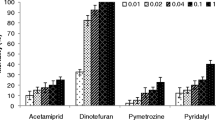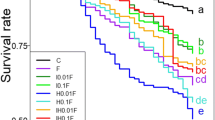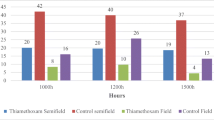Abstract
Acetamiprid and ergosterol-inhibiting fungicide (EBI) are frequently applied to many flowering plants, while honey bees are pollinating agents or pollinators of the flowers. Hence honey bees are often exposed to these pesticides. But until now, the effects of theses combinations at field-realistic doses on honey bee health have been poorly investigated. In this study, we explore the synergistic mortality and some physiological effects in surviving honey bees after chronic oral exposure to acetamiprid and/or propiconazole in the laboratory. The results indicated that chronic combined exposure to acetamiprid and propiconazole produced a significant synergistic effect on mortality both for newly emerged bees (50% mortality in 7.2 days) and forager bees (50% mortality in 4.8 days). Honey bee weight of newly emerged bees was decreased after feeding food with a field concentration of acetamiprid and propiconazole, alone or combined for 10 days. Combination of acetamiprid and propiconazole also modulated the activities of P450s, GST and CAT in newly emerged bees and forager bees than either alone, but neither pesticide affected the activity of AChE. These results show that chronic combined exposure to pesticides of relatively low toxicity may caused severely physiological disruptions that could be potentially damaging for the honey bees.







Similar content being viewed by others
References
Alburaki M, Steckel SJ (2017) Landscape and pesticide effects on honey bees-forager survival and expression of acetylcholinesterase and brain oxidative genes. Apidologie 48:556–571
Badawy MEI, Nasr HM, Rabea EI (2015) Toxicity and biochemical changes in the honey bee Apis mellifera exposed to four insecticides under laboratory conditions. Apidologie 46:177–193. https://doi.org/10.1007/s13592-014-0315-0
Badiou-Bénéteau A, Carvalho SM, Brunet J-L, Carvalho GA, Buleté A, Giroud B, Belzunces LP (2012) Development of biomarkers of exposure to xenobiotics in the honey bee Apis mellifera: application to the systemic insecticide thiamethoxam. Ecotox Environ Safe 82:22–31. https://doi.org/10.1016/j.ecoenv.2012.05.005
Badiou A, Brunet J-L, Belzunces LP (2007) Existence of two membrane-bound acetylcholinesterases in the honey bee head. Arch Insect Biochem 66:122–134. https://doi.org/10.1002/arch
Berenbaum MR, Johnson RM (2015) Xenobiotic detoxification pathways in honey bees. Curr Opin Insect Sci 10:51–58. https://doi.org/10.1016/j.cois.2015.03.005
Carvalho SM, Belzunces LP, Carvalho GA, Brunet J-L, Badiou-Beneteau A (2013) Enzymatic biomarkers as tools to assess environmental quality: a case study of exposure of the honeybee Apis mellifera to insecticides. Environ Toxicol Chem 32:2117–2124. https://doi.org/10.1002/etc.2288
Chaimanee V, Evans JD, Chen Y, Jackson C, Pettis JS (2016) Sperm viability and gene expression in honey bee queens (Apis mellifera) following exposure to the neonicotinoid insecticide imidacloprid and the organophosphate acaricide coumaphos. J Insect Physiol 89:1–8
Chakroun S et al. (2016) Hematological, biochemical, and toxicopathic effects of subchronic acetamiprid toxicity in Wistar rats. Environ Sci Pollut Res 23:25191–25199
Chen C et al. (2017) Managed honeybee colony losses of the Eastern honeybee (Apis cerana) in China (2011–2014). Apidologie 48:692–702
Christen V, Bachofer S, Fent K (2017) Binary mixtures of neonicotinoids show different transcriptional changes than single neonicotinoids in honeybees (Apis mellifera). Environ Pollut 220:1264–1270
Collins AM, Pettis JS (2013) Correlation of queen size and spermathecal contents and effects of miticide exposure during development. Apidologie 44:351–356. https://doi.org/10.1007/s13592-012-0186-1
David A, Botías C, Abdul-Sada A, Goulson D, Hill EM (2015) Sensitive determination of mixtures of neonicotinoid and fungicide residues in pollen and single bumblebees using a scaled down QuEChERS method for exposure assessment. Anal Bioanal Chem 407:8151–8162. https://doi.org/10.1007/s00216-015-8986-6
David A, Botías C, Abdul-Sada A, Nicholls E, Rotheray EL, Hill EM, Goulson D (2016) Widespread contamination of wildflower and bee-collected pollen with complex mixtures of neonicotinoids and fungicides commonly applied to crops. Environ Int 88:169–178. https://doi.org/10.1016/j.envint.2015.12.011
Decourtye A, Armengaud C, Renou M, Devillers J, Cluzeau S, Gauthier M, Pham-Delègue M-H (2004a) Imidacloprid impairs memory and brain metabolism in the honeybee (Apis mellifera L.). Pestic Biochem Phys 78:83–92. https://doi.org/10.1016/j.pestbp.2003.10.001
Decourtye A, Devillers J (2010) Ecotoxicity of neonicotinoid insecticides to bees. Adv Exp Med Biol 683:85–95
Decourtye A, Devillers J, Cluzeau S, Charreton M, Pham-Delègue M-H (2004b) Effects of imidacloprid and deltamethrin on associative learning in honeybees under semi-field and laboratory conditions. Ecotox Environ Safe 57:410–419. https://doi.org/10.1016/j.ecoenv.2003.08.001
Devan RKS, Mishra A, Prabu PC, Mandal TK, Panchapakesan S (2015) Sub-chronic oral toxicity of acetamiprid in Wistar rats. Toxico Enviro Chem 97:1236–1252
Dolezal AG, Carrillo-Tripp J, Miller WA, Bonning BC, Toth AL (2016) Pollen contaminated with field-relevant levels of cyhalothrin affects honey bee survival, nutritional physiology, and pollen consumption behavior. J Econ Entomol 109:41–48
Domingues CEC, Abdalla FC, Balsamo PJ, Pereira BVR, Hausen MdA, Costa MJ, Silva-Zacarin ECM (2017) Thiamethoxam and picoxystrobin reduce the survival and overload the hepato-nephrocitic system of the Africanized honeybee. Chemosphere 186:994–1005. https://doi.org/10.1016/j.chemosphere.2017.07.133
El Hassani AK, Dacher M, Gary V, Lambin M, Gauthier M, Armengaud C (2008) Effects of sublethal doses of acetamiprid and thiamethoxam on the behavior of the honeybee (Apis mellifera). Arch Environ Con Tox 54:653–661. https://doi.org/10.1007/s00244-007-9071-8
Forman HJ, Zhang H, Rinna A (2009) Glutathione: overview of its protective roles, measurement, and biosynthesis. Mol Asp Med 30:1–12. https://doi.org/10.1016/j.mam.2008.08.006
Gemeda TK, Shao Y, Wu W, Yang H, Huang J, Wu J (2017) Native honey bees outperform adventive honey bees in increasing Pyrus bretschneideri (Rosales—Rosaceae) pollination. J Econ Entomol 110:2290–2294
Gill RJ, Ramos-Rodriguez O, Raine NE (2012) Combined pesticide exposure severely affects individual- and colony-level traits in bees. Nature 491:105–108. https://doi.org/10.1038/nature11585
Godfray HCJ et al. (2014) A restatement of the natural science evidence base concerning neonicotinoid insecticides and insect pollinators. P Roy Soc B- Biol Sci 281:20140558
Gottardi M, Kretschmann A, Cedergreen N (2015) Measuring cytochrome P450 activity in aquatic invertebrates: a critical evaluation of in vitro and in vivo methods. Ecotoxicology 25:419–430. https://doi.org/10.1007/s10646-015-1600-z
Goulson D, Nicholls E, Botias C, Rotheray EL (2015) Bee declines driven by combined stress from parasites, pesticides, and lack of flowers Science 347:1255957. https://doi.org/10.1126/science.1255957
Gross M (2013) EU ban puts spotlight on complex effects of neonicotinoids. Curr Biol 23:R462–R464. https://doi.org/10.1016/j.cub.2013.05.030
Han W et al. (2017) Potential synergistic effect of common fungicides on acetamiprid toxicity to chinese honeybee (Apis cerana cerana). Asian. J Ecotoxicol 12:273–280
Henry M et al. (2012) A common pesticide decreases foraging success and survival in honey bees. Science 336:348–350
Hyne RV, Maher WA (2003) Invertebrate biomarkers: links to toxicosis that predict population decline. Ecotox Environ Safe 54:366–374. https://doi.org/10.1016/s0147-6513(02)00119-7
Iwasa T, Motoyama N, Ambrose JT, Roe RM (2004) Mechanism for the differential toxicity of neonicotinoid insecticides in the honey bee, Apis mellifera. Crop Prot 23:371–378. https://doi.org/10.1016/j.cropro.2003.08.018
Jeschke P, Nauen R, Schindler M, Elbert A (2011) Overview of the status and global strategy for neonicotinoids. J Agr Food Chem 59:2897–2908. https://doi.org/10.1021/jf101303g
Johnson RM, Ellis MD, Mullin CA, Frazier M (2010) Pesticides and honey bee toxicity––USA. Apidologie 41:312–331. https://doi.org/10.1051/apido/2010018
Kiljanek T, Niewiadowska A, Gaweł M, Semeniuk S, Borzęcka M, Posyniak A, Pohorecka K (2017) Multiple pesticide residues in live and poisoned honeybees—preliminary exposure assessment. Chemosphere 175:36–44
Klein A-M, Vaissière BE, Cane JH, Steffan-Dewenter I, Cunningham SA, Kremen C, Tscharntke T (2007) Importance of pollinators in changing landscapes for world crops. Proc Biol Sci 274:303–313
Koch H, Weißer P (1997) Exposure of honey bees during pesticide application under field conditions. Apidologie 28:439–447
Krupke CH, Hunt GJ, Eitzer BD, Andino G, Given K (2012) Multiple routes of pesticide exposure for honey bees living near agriculture fields. PLoS ONE 7:e29268. https://doi.org/10.1371/journal.pone.0029268.t001
Lee KV et al. (2015) A national survey of managed honey bee 2013–2014 annual colony losses in the USA. Apidologie 46:292–305. https://doi.org/10.1007/s13592-015-0356-z
Li G, Jia H, Wang H, Yan Y, Guo X, Sun Q, Xu B (2016) A typical RNA-binding protein gene (AccRBM11) in Apis cerana cerana - characterization of AccRBM11 and its possible involvement in development and stress responses. Cell Stress Chaperon- 21:1005–1019
Li J, Wang Q, Zhang L, Gao X (2012) Characterization of imidacloprid resistance in the housefly Musca domestica (Diptera: Muscidae). Pestic Biochem Phys 102:109–114. https://doi.org/10.1016/j.pestbp.2011.10.012
Li Z-H, Zlabek V, Grabic R, Li P, Machova J, Velisek J, Randak T (2010a) Effects of exposure to sublethal propiconazole on intestine-related biochemical responses in rainbow trout, Oncorhynchus mykiss. Chem-Biol Interact 185:241–246
Li Z-H, Zlabek V, Li P, Grabic R, Velisek J, Machova J, Randak T (2010b) Biochemical and physiological responses in liver and muscle of rainbow trout after long-term exposure to propiconazole. Ecotox Environ Safe 73:1391–1396. https://doi.org/10.1016/j.ecoenv.2010.05.017
Liu L et al. (2017) A genome-wide analysis of simple sequence repeats in Apis cerana and its development as polymorphism markers. Gene 59:53–59
Lundin O, Rundlöf M, Smith HG, Fries I, Bommarco R (2015) Neonicotinoid insecticides and their impacts on bees: a systematic review of research approaches and identification of knowledge gaps. PLoS ONE 10:e0136928. https://doi.org/10.1371/journal.pone.0136928
Matsumoto T (2013) Reduction in homing flights in the honey bee Apis mellifera after a sublethal dose of neonicotinoid insecticides. B Insect 66:1–9
Mullin CA, Frazier M, Frazier JL, Ashcraft S, Simonds R, vanEngelsdorp D, Pettis JS (2010) High levels of miticides and agrochemicals in north american apiaries: implications for honey bee health. PLoS ONE 5:e9754. https://doi.org/10.1371/journal.pone.0009754
Pettis JS, Lichtenberg EM, Andree M, Stitzinger J, Rose R, vanEngelsdorp D (2013) Crop pollination exposes honey bees to pesticides which alters their susceptibility to the gut pathogen Nosema ceranae. PLoS ONE 8:e70182. https://doi.org/10.1371/journal.pone.0070182.t001
Pisa LW et al. (2015) Effects of neonicotinoids and fipronil on non-target invertebrates. Environ Sci Pollut R 22:68–102. https://doi.org/10.1007/s11356-014-3471-x
Potts SG et al. (2010) Declines of managed honey bees and beekeepers in Europe. J Apic Res 49:15–22. https://doi.org/10.3896/ibra.1.49.1.02
Renzi MT et al. (2016) Chronic toxicity and physiological changes induced in the honey bee by the exposure to fipronil and Bacillus thuringiensis spores alone or combined. Ecotox Environ Safe 127:205–213. https://doi.org/10.1016/j.ecoenv.2016.01.028
Roat TC, Carvalho SM, Palma MS, Malaspina O (2017) Biochemical response of the Africanized honeybee exposed to fipronil. Environ Toxicol Chem 36:1652–1660. https://doi.org/10.1002/etc.3699
Robinson A et al. (2017) Comparing bee species responses to chemical mixtures: common response patterns? PLoS ONE 12:e0176289. https://doi.org/10.1371/journal.pone.0176289
Sanchez-Bayo F, Goka K (2014) Pesticide residues and bees—a risk assessment. PLoS ONE 9:e94482. https://doi.org/10.1371/journal.pone.0094482
Schuler MA (2011) P450s in plant-insect interactions. Biochim Biophys Acta 1814:36–45
Sgolastra F et al. (2017) Synergistic mortality between a neonicotinoid insecticide and an ergosterol-biosynthesis-inhibiting fungicide in three bee species. Pest Manag Sci 73:1236–1243
Shimomura M, Yokota M, Ihara M, Akamatsu M, Sattelle DB, Matsuda K (2006) Role in the selectivity of neonicotinoids of insect-specific basic residues in loop D of the nicotinic acetylcholine receptor agonist binding site. Mol Pharmacol 70:1255–1263. https://doi.org/10.1124/mol.106.026815
Tabassum H, Khan J, Salman M, Raisuddin S, Parvez S (2016) Propiconazole induced toxicological alterations in brain of freshwater fish Channa punctata Bloch. Ecol Indic 62:242–248
Thompson HM, Fryday SL, Harkin S, Milner S (2014) Potential impacts of synergism in honeybees (Apis mellifera) of exposure to neonicotinoids and sprayed fungicides in crops. Apidologie 45:545–553. https://doi.org/10.1007/s13592-014-0273-6
Tong Z et al. (2016) Multi-residue analysis of pesticide residues in crude pollens by UPLC-MS/MS. Molecules 21:1652. https://doi.org/10.3390/molecules21121652
van der Zee R, Gray A, Pisa L, de Rijk T (2015) An observational study of honey bee colony winter losses and their association with Varroa destructor, neonicotinoids and other risk factors. PLoS ONE 10:e0131611. https://doi.org/10.1371/journal.pone.0131611
vanEngelsdorp D, Meixner MD (2010) A historical review of managed honey bee populations in Europe and the United States and the factors that may affect them. J Invertebr Pathol 103:S80–S95. https://doi.org/10.1016/j.jip.2009.06.011
Wang Y, Gao J, Han W, Liu J, Wang Y, Fu S, Zhao D (2017) Acute toxicity and hazard assessment of 10 fungicides on Apis cerana cerana. J Environ Entomol 39:126–133
Wu JY, Anelli CM, Sheppard WS (2011) Sub-lethal effects of pesticide residues in brood comb on worker honey bee (Apis mellifera) development and longevity. PLoS ONE 6:e14720. https://doi.org/10.1371/journal.pone.0014720
Xu P, Shi M, Chen X-x (2009) Antimicrobial peptide evolution in the asiatic honey bee Apis cerana. PLoS ONE 4:e4239. https://doi.org/10.1371/journal.pone.0004239
Yang EC, Chuang YC, Chen YL, Chang LH (2008) Abnormal foraging behavior induced by sublethal dosage of imidacloprid in the honey bee (Hymenoptera: Apidae). J Econ Entomol 101:1743–1748
Yue M, Luo S, Liu J, Wu J (2018) Apis cerana is less sensitive to most neonicotinoids, despite of their smaller body mass. J Econ Entomol 111:39–42. https://doi.org/10.1093/jee/tox342
Zhang B, Kong F, Wang H, Gao X, Zeng X, Shi X (2016) Insecticide induction of O-demethylase activity and expression of cytochrome P450 genes in the red imported fire ant (Solenopsis invicta Buren). J Integr Agr 15:135–144
Zhu YC, Yao J, Adamczyk J, Luttrell R (2017a) Feeding toxicity and impact of imidacloprid formulation and mixtures with six representative pesticides at residue concentrations on honey bee physiology (Apis mellifera). PloS ONE 12:e0178421. https://doi.org/10.1371/journal.pone.0178421
Zhu YC, Yao J, Adamczyk J, Luttrell R (2017b) Synergistic toxicity and physiological impact of imidacloprid alone and binary mixtures with seven representative pesticides on honey bee (Apis mellifera). PloS ONE 12:e0176837. https://doi.org/10.1371/journal.pone.0176837
Acknowledgements
We gratefully acknowledge anonymous reviewers for their valuable comments and suggestions.
Funding
This study was found by the National Special Construction Apiculture Technology System of China (No. CARS-44-SYZ13, CARS-44-KXJ10), the State Level-scientific Institute Basal Research Fund of China (No. 2016hzs1J018; No.1630042018006) and the Youth Innovation Project of Hainan Science & Technology Association (QCXM201712).
Author information
Authors and Affiliations
Corresponding authors
Ethics declarations
Conflict of interest
The authors declare that they have no conflict of interest.
Ethical approval
All applicable international, national, and/or institutional guidelines for the care and use of animals were followed.
Additional information
Publisher’s note: Springer Nature remains neutral with regard to jurisdictional claims in published maps and institutional affiliations.
Rights and permissions
About this article
Cite this article
Han, W., Yang, Y., Gao, J. et al. Chronic toxicity and biochemical response of Apis cerana cerana (Hymenoptera: Apidae) exposed to acetamiprid and propiconazole alone or combined. Ecotoxicology 28, 399–411 (2019). https://doi.org/10.1007/s10646-019-02030-4
Accepted:
Published:
Issue Date:
DOI: https://doi.org/10.1007/s10646-019-02030-4




